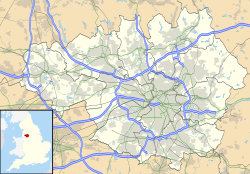Baron Street drill hall, Rochdale facts for kids
Quick facts for kids Baron Street drill hall |
|
|---|---|
| Rochdale | |

Baron Street drill hall
|
|
|
Location within Greater Manchester
|
|
| Coordinates | 53°36′52″N 2°09′09″W / 53.61458°N 2.15241°W |
| Type | Drill hall |
| Site history | |
| Built | c.1865 |
| Built for | War Office |
| In use | c.1865-1980s |
The Baron Street drill hall is an old building in Rochdale, England. It used to be a place where soldiers trained and prepared for military duties. Think of it like a special gym and meeting place for army units.
A Place for Soldiers
Early Days and Training
This building was built around 1865. It was designed to be the main base for a group called the 12th Lancashire Rifle Volunteers. These were local people who volunteered to train as soldiers. They practiced drills and learned military skills here.
Over time, this group changed its name. In 1883, they became the 2nd Volunteer Battalion of the Lancashire Fusiliers. A battalion is a large group of soldiers, usually hundreds strong. Then, in 1908, they changed their name again to the 6th Battalion, the Lancashire Fusiliers.
World War I and Beyond
When World War I started in August 1914, the soldiers of the 6th Battalion gathered at this drill hall. They were "mobilised," which means they were officially called up for active duty. From here, they were sent to fight in places like Gallipoli. Later, they moved to the Western Front, which was a major battle line in France and Belgium.
The drill hall continued to be used by this battalion until World War II. After World War II ended, the 6th Battalion was no longer active. However, parts of another group, the 5th (Volunteer) Battalion, still used the building. They continued to train and meet there until the 1980s.
What Happened Next?
In the 1980s, the Baron Street drill hall was "decommissioned." This means it was officially taken out of military service. The building was then sold. Today, it is used for industrial purposes, no longer for soldiers.


